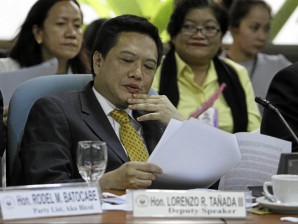
Erin Tanada during the House of Representatives committee hearing on public information regarding the Freedom of Information (FOI) Bill. INQUIRER FILE PHOTO
MANILA, Philippines—The recent debates on Senate President Juan Ponce Enrile’s P1.6-million cash gifts to 18 senators should be reason enough for the passage of a savings measure in Congress.
Deputy Speaker Lorenzo Tañada III said that the Budget Savings Act of 2010 was pending in the lower chamber’s appropriations panel since August 8, 2011.
The bill, which seeks to give a “clear-cut definition of what savings is” and determine how it should be utilized, could have prevented the issue on Enrile’s cash gifts to the senators.
House Bill 4992, authored by Tañada, could resolve issues with savings which are sometimes done “deliberately… not fully utilizing allocated budgets for some projects, programs and even capital outlay only to use these un-spent funds for staff and officials’ bonuses at the end of the year.”
“Even without the word war in the Senate with regard to how they dispensed with their savings, Congress should really give a clear-cut definition of what ‘savings’ is and more importantly, what should be done with it,” said the House leader.
Admitting that HB 4992 needs further refinements, Tañada said that it would be best to hold a public hearing to thresh out the bill’s provisions.
HB 4992 defines savings as “the unexpended balances of an appropriation authorized in the General Appropriations Act (GAA) or unobligated amount of allotment released by the Department of Budget and Management (DBM), as determined by the agency budget officers and certified by the Departments/Agencies, including the Senate and the House of Representatives, as well the constitutional bodies and offices enjoying fiscal autonomy, resulting from the completion or final discontinuance or abandonment of the work, activity or purpose for which the appropriation is authorized; from appropriation/allotment balances arising from unpaid compensation and related costs pertaining to vacant positions and leaves of absence without pay; and from appropriations balances realized from the implementation of measures resulting in improved systems and efficiencies and thus enabled an agency to meet and deliver the required or planned targets, programs and services approved in the GAA at a lesser cost. The term, however, does not include unexpended portion of any re-enacted national budget.”
It will also require from the DBM quarterly financial reports from all government agencies, including the House, the Senate, Constitutional bodies and offices enjoying fiscal autonomy. Absence of such reports will revert an agency’s savings to the General Fund at the end of the fiscal year.